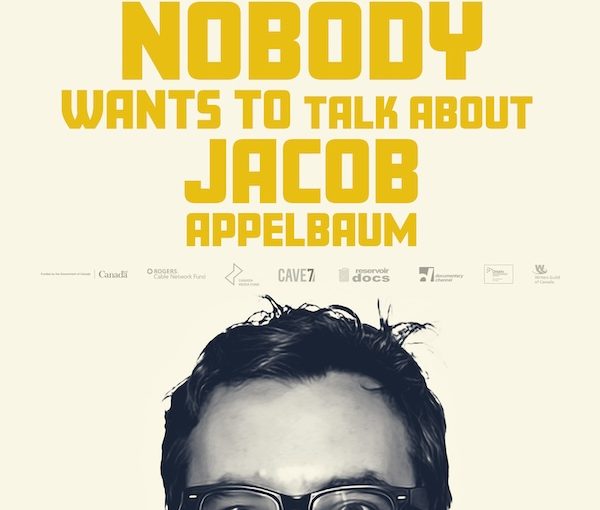Nobody Wants to Talk About Jacob Appelbaum opens at VIFF Centre June 14.
Jacob Appelbaum was an influential internet freedom, privacy and free speech activist. He collaborated with Julian Assange and WikiLeaks, which Assange founded in 2006 to publish leaked documents and information. He helped the journalists with whom whistleblower Edward Snowden shared documents make the stories public. And he was prominent in the TOR Project (aka “the dark web”). Then, suddenly, Appelbaum took himself out of the spotlight.
Writer, director and producer Jamie Kastner wanted to know why. He also wanted to know more about this well-known yet little-known “hacktivist” and the subculture in which Appelbaum operated. The result is the documentary Nobody Wants to Talk About Jacob Appelbaum, which screens at VIFF Centre June 14-17 and June 20.
“I first saw Appelbaum in another documentary about WikiLeaks, in which he was playing a supporting role,” Kastner told the Independent. “He jumped off the screen both for his charisma and his clear-eyed and apparently fearless political commitment. I learned about the broad strokes of the scandal in which he was later involved, became intrigued not only by what had happened with him, but by this whole activist community about which I had known little.”
After being accused of sexual abuse in 2016, Appelbaum left the United States for Germany. It is there, reads the documentary’s PR material, that Kastner “finds him, adamant that he is the victim of government black ops, ‘canceled’ without legal process or recourse, punished for who he is, and for what he represents.”
“Though I’m sure even he would not claim that all the work he has done has been flawless,” said Kastner, “to me there remains at least an aspect to the work he’s done, regardless of what may or may not have come later, that represents a fearless standing up to authority, taking significant personal risks to expose abuses of power and to help improve people’s lives by making them better informed about governments and surveillance.”
He continued, “As lawyer Margaret Ratner Kunstler explains in the film, in an era in which journalism has shrunk and become ever more controlled by government and/or large corporations, the significance of so-called leakers and hackers has grown to become one of our last sources of unfiltered news and information.”
Kastner gave the examples of WikiLeaks having “released Chelsea Manning’s leaks, including the ‘Collateral Murder’ video of American drones killing civilians and journalists in Iraq in 2007, and a trove of Hillary Clinton’s emails in 2016, among many other controversial releases.”
In 2013, Snowden, “a former contractor for the National Security Agency, America’s cyber-intelligence gathering service … leaked a vast trove of documents revealing the information gathering practices of the US and its ‘Five Eyes’ allies countries, including how data was gathered covertly on their own citizens,” said Kastner.
With Snowden, the filmmaker added, Appelbaum “helped the journalists to whom Snowden leaked his documents both manage the technology involved, and investigate and disseminate stories arising from Snowden’s leaks, including penning a cover story in German newsmagazine Der Speigel revealing that the US was spying on Chancellor Angela Merkel’s cellphone.”
Nobody Wants to Talk About Jacob Appelbaum was about five years in the making.
“It was a slow and wary process, once contact was made, of gaining access to Appelbaum and establishing trust on both sides,” explained Kastner. “I knew he was a controversial, brilliant and at times troubled figure, but I approached the story with an open mind. It struck me as a fascinating story in which one person’s trajectory tracked the rise and fall of a movement that, for a time, was rocking the world.
“I worked with a team of researchers to gain necessary context and try to build relationships within this very wary community. I worked extensively – features, in my experience, take six months or so in editing – with my collaborator Michael Hannan in the edit suite, to try to craft a film that would make the audience experience the real-life spy quality I experienced in entering into Appelbaum’s world, in which things, at times, seem too fantastical to be true – but sufficient evidence is there to suggest they are not false.”
Kastner’s many credits – through his and wife Laura Baron Kastner’s Cave 7 Productions – include The Skyjacker’s Tale (2016), There Are No Fakes (2019) and Charlotte’s Castle (2023). Cave 7 documentaries have not only garnered award recognition but inspired action. There Are No Fakes, for example, helped launch “a criminal investigation into widespread fraudulent production of and distribution of Indigenous art,” leading to “eight arrests, 40 charges laid and 1,000 paintings seized,” notes the company.
As a documentarian, Kastner is especially aware of the evasiveness of “the truth” and its often-subjective nature. While he said, “I still admire the same qualities about Appelbaum that first drew me to the subject, his political spirit and work,” the making of the documentary took him to all sorts of places he hadn’t expected.
“Learning about the community from which he and Assange sprung made me realize the film was about a larger story, larger issues which the narrative of Appelbaum’s life raises,” said Kastner. “You don’t have to like him, the film is not an apologia or a hagiography. I investigate the accusations as extensively as possible. Ultimately, as the title suggests, the film equally became about the people who don’t want to talk about him, and the many reasons for that. I don’t think I had fixed ideas about the ‘truth’ going into this film. I don’t pretend the film leaves with any one conclusion, but rather hopefully, is the jumping-off point for further discussion.”
For tickets to a screening, visit viff.org/whats-on/nobody-talk-jacob-appelbaum. The documentary will start streaming on CBC Gem on June 26.

